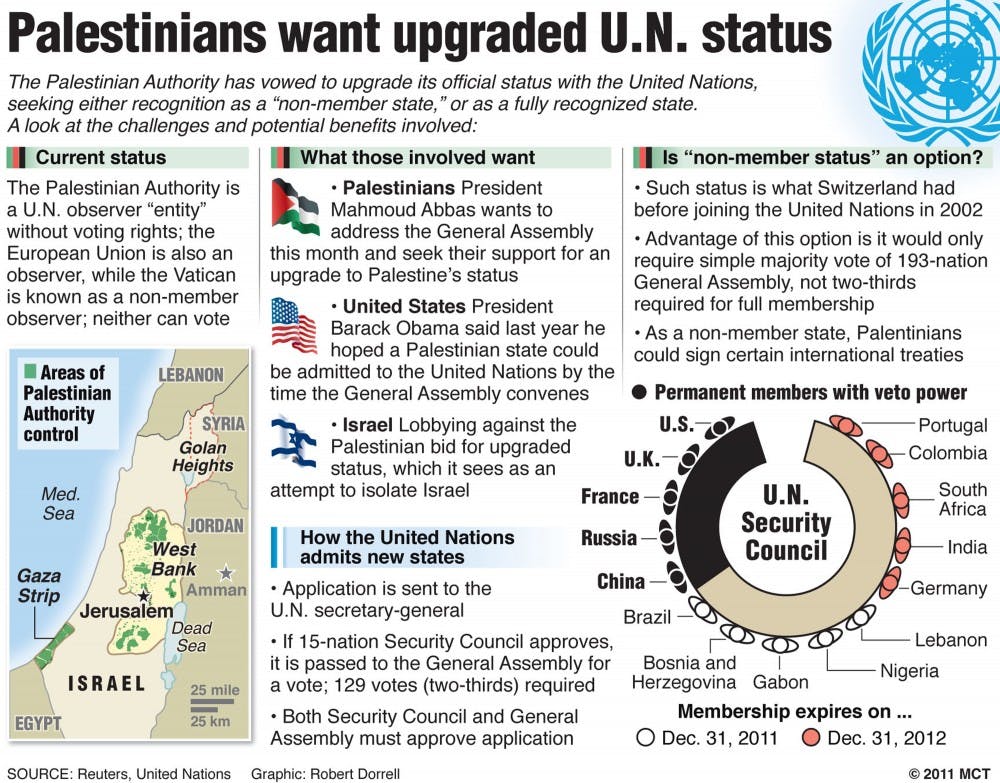HAIFA, ISRAEL — It's been about two months since Mahmoud Abbas, president of the Palestinian Authority, stood before the United Nations General Assembly to formally request recognition of a Palestinian state. In the weeks since his plea and the United States' firm declaration it will not support a move to create a new state, the resolution has been neither passed nor denied. And Israel and Palestine are no closer to resolving their decades-long conflict.
"Everything is caught up in the refugee issue," said Elliot Chodoff, a political and military analyst and professor at the University of Haifa. "Israel won't agree to that."
Palestinians consider anyone who lived or who was born in the former Palestine to be a refugee, he said, and have demanded their right to return to Israel and what was once their homeland.
But Israeli leadership is equally adamant that the right of return will not be allowed.
"If the state of Israel (gains) a Palestinian majority, Israel ceases to be a Jewish state," Chodoff said. "As soon as (the refugees) have Palestinian citizenship, they stop being refugees."
Israel refuses to accept a Palestinian majority but cannot allow the refugees to return without giving them complete rights of citizenship — that would be apartheid, according to Chodoff. Palestinians have yet to accept the Jewish state and have said they would be willing to wait 1,000 years to achieve statehood under their own terms.
"The basic assumption out there is that the Palestinian leadership wants a state, which is problematic because they're doing everything possible not to have one," Chodoff said. "They say many different things to different people. So either they're incompetent — I don't think so — or something else is going on. The conflict's more important to them than a state."
Yisrael Ne'eman, a professor of Israeli history and society at the University of Haifa, agreed that Abbas' desire for a two-state solution will likely not be realized any time soon.
"Abbas might want a two– state solution but cannot deliver," he said. "Foremost, he does not have the necessary support from his own people whether they be secular or Islamist. Even many somewhat secular Palestinians — almost all are traditional in one way or another — do not accept the legitimacy of Israel as the Jewish State."
Despite being the internationally recognized leader of Palestine, Abbas also lacks control of Gaza, which contains about a third of the Palestinian population, according to Ne'eman. He said he does not know of any Palestinians who believe the UN resolution will result in statehood.
"They've gotten Israel to the point where there's nothing left for Israel to compromise on," Chodoff said. "We're not giving them 1967 territory, maybe (only) a land swap. The maximum they're getting is the West Bank and Gaza. No one expects Israel to cede additional territory to them in order to get them to declare independence (and end the conflict)."
Palestinian leadership bodies: A brief history
Hamas. PA. PLO. Fatah. The names of the major Palestinian leadership bodies are mentioned on the news almost every day, and they come up regularly in conversation about the situation in Israel and the Palestinian Territories. Most people know Mahmoud Abbas, president of the PA and submitter of the proposal at the UN to recognize Palestinian statehood, which currently does not have enough support to pass. But how many people are knowledgeable about the basics of these groups: their backgrounds, motives, and relationship with Israel?
The first major Palestinian nationalist organization after the end of the British mandate and formation of Israel was created in the mid-1960s: the Palestinian Liberation Organization, a guerilla-based association of numerous smaller groups, first headed by Yasser Arafat, the political head of major PLO faction Fatah. The PLO sent raids into Israel from bases in neighboring Arab countries for decades, and gained membership in the Arab League in 1976. In 1989, Arafat was elected president of the newly declared state of Palestine, and tried throughout the 1990s to establish peace with Israel. However, these negotiations eventually collapsed.
The Oslo Accords between Israel and the PLO in 1993 established the Palestinian Authority to govern the West Bank and Gaza Strip. The PA has since become one of the main Palestinian representative bodies (although the PLO is the only one recognized internationally). Abbas became its first prime minister in 2003, and is currently the President.
Hamas is a militant and religious group whose main objective is the eradication of Israel through jihad, and the establishment of a Palestinian state. Religious members of the Muslim Brotherhood and PLO founded it during the First Intifada, in 1987. Hamas opposed both the PLO's 1988 recognition of Israel and the Oslo Accords, and have rejected the peace process, continuing to commit acts of terrorism and violence against Israel, much of which has been returned in kind. Hamas's leader since 2004 is Khaled Mashal.
An election upset in 2006 put the more radical Hamas in charge in Gaza, from which Israel had just finished withdrawing. Hamas and Fatah tried to govern together there, but in 2007, Hamas drove Fatah out of Gaza. Abbas dissolved Hamas nominally, but has not been able to establish control over Gaza. However, as of this week, Hamas and Fatah are in talks to reestablish a coalition government, including new elections for Palestinian Leadership.
Palestinian leaders and residents have been at odds with Israel for most of the nation's history, and the ongoing hostilities have complicated roots and no easy solutions.


